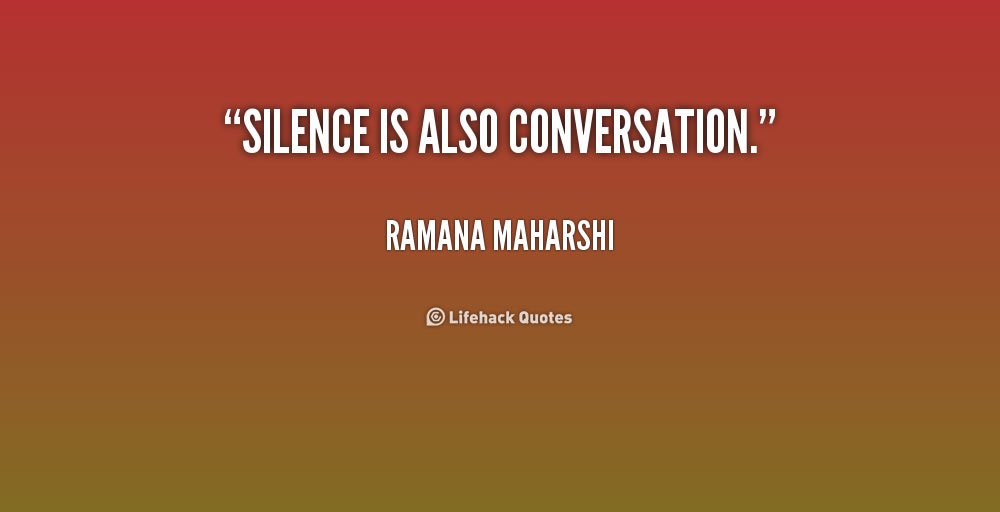Why should we learn to be more silent and when do we need to be silent?
Knowing how to listen is one of the important factors that helps you become a good communicator. However, listening is not enough, you also need to learn to be silent.
We should learn to listen to understand, stop to love and know how to let go of arrogance to see this life is impermanent .
Silence does not mean saying nothing when someone is talking to you. Silence does not mean being passive, indifferent to everything around. Silence is when you feel more about things, better understand the cause - the consequences and more importantly, silence is also a way for you to express your feelings to the opposite person.
Sometimes, silence is much more powerful than a beautiful, winged speech.
Saying or being silent must be in the right place, at the right time, right person and only used when necessary. Words can be swords, unused swords put in bags. Silence is wonderful when words are ineffective or counterproductive. If used wrong, silence can be a disaster. That is the value of silence and "art" silence.

Here are a few very valuable tips to help you know when to be silent and when to speak.
When silence is gold:
♥ Keeping quiet can be as powerful as the words you want to say, like when a hug is far more valuable than the "Condolence for your loss" sentence .
♥ Know fun with happy, sad people with sad people. It is the behavior of knowledgeable, polite and empathetic people. Nothing is more ungainly when others cry and I laugh or vice versa. That "phase difference" is likely to make us ridiculous, snobbish and arrogant.
♥ Another time when you are not sure what to say. If you feel confused when your own emotions are moving toward a certain problem, it is best to remain silent until you feel more certain because there are more risks when expressing the wrongs. or outrageous emotions.
♥ Choose silence instead of uttering temporary emotions that can hurt others and that really isn't your feelings. When you have the urge to say something bad, take a few deep breaths and think about the possible consequences later.
♥ Another time when you are best should be silent when someone shares a meaningful story. Let them feel listened with a gesture of silent nod and shared eyes.
♥ Knowing, sir, if you don't know, you can use columns to listen. The wise man only says what he knows and is completely silent for what he does not know or is vague. The scientist Thomas Edison once said: "What we know is just a drop of water, which we don't know is the whole ocean." And the philosopher Socrates admits: "I don't know anything, that's what I know best".

♥ Silence can be good friends in negotiations. Say your part, then, be quiet so others can come to their own conclusions. Your silence shows you are confident about what you have said and you have enough respect for the other person to hear what they say.
♥ When it is not understood, we need to be open and sociable so that others can understand us better - even if we can't understand it all. However, if you feel that they really can't understand or don't want to understand, it's best to be silent. If not, what you say can create discomfort and hatred.
♥ Sometimes silence is the best and most timely solution because the opponent is not in a position to listen to what you say. For example, when a friend needs you to listen to personal problems, she cannot accept your advice at that time. Besides, saying a lot is wrong. Say biased, lose the main reason, speak wildly, then go to the place of drowning, say skepticism, then go to the wrong place, say hidden will come to the same place.
♥ Practice the habit of keeping quiet at work when you have no meaning to contribute. Unless you can raise the conversation by giving some interesting, flawed or beneficial ideas, it's best to just sit and observe.
♥ Silence is sometimes a time when people are working their minds. Thanks to that, there are masterpieces, nobility, understanding, maturity, reverence and enlightenment . The great writer W. Goethe once said: "Talent is nurtured in solitude, and the spirit is created by the waves of life storms ". Seeing others thoughtfully, do not break their "own". The silence at that time was really necessary and meaningful.
♥ Finally, silence is golden when you don't want to stick to a silly debate. Because quarrels will never be solved, one must "suck the sweets to sweeten".

When to say and speak aloud:
♣ There will be times in your life where you need the power of your voice. Your inner voice needs to be respected and grateful.
♣ Use your voice and speak out when your emotions are being trampled. There are many things that are out of control, but controlling words and emotions that want to convey to others is entirely within our jurisdiction.
♣ Express your emotions clearly and let everyone know that you value the interests of both parties.
Ùm Tell others when they don't have a voice or they can't speak for some reason. Your voice can be the only thing that saves and protects them from harm.
♣ Speak out when you see a wrong thing done because silence can be considered complicit in wrongdoing.
♣ Say it when you are asked about your point of view because the person who asks it takes it seriously.
♣ Finally, say it when you want to hear it. Whether in the workplace or in the relationship, if you believe that what you say is valuable, don't be afraid to open your mouth.
Guan Zi teaches: "Silence, listen, remember, act and be wise are 5 different levels of wisdom". So, don't ignore learning to be silent.
You should read it
- ★ 4 signs that you are talking too much at work
- ★ Voice in communication and how to have a good voice?
- ★ Train these 10 habits, you will become more attractive in the eyes of others
- ★ The unexplained mystery series in the terrestrial Bermuda triangle of demons
- ★ 3 things that absolute smart people never say